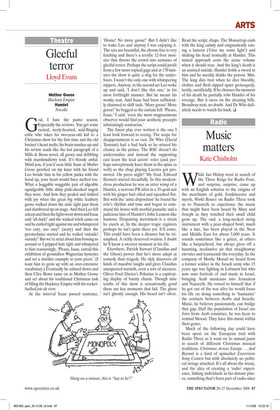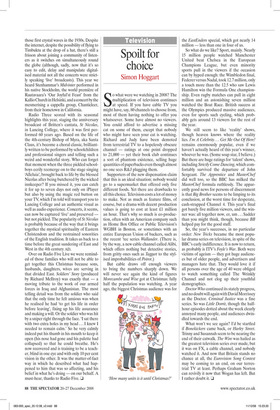Music matters
Kate Chisholm
While Ian Hislop went in search of the Three Kings for Radio Four, and surprise, surprise, came up with an English solution to the enigma of the merchants of gold, frankincense and myrrh, World Routes on Radio Three took us to Nazareth to experience the music that might have been heard by Mary and Joseph as they watched their small child grow up. The oud, a long-necked string instrument with a pear-shaped bowl, much like a lute, has been played in the Near and Middle East for about 5,000 years. It sounds sometimes like a guitar, at others like a harpsichord, but always gives off a haunting, meditative air that straightaway elevates and transcends the everyday. In the company of Moshe Morad we heard from a former soldier in the Israeli army who 15 years ago was fighting in Lebanon but who now runs festivals of oud music in Israel, bringing Arab musicians into Jerusalem and Nazareth. He vowed to himself that if he got out of the war alive he would focus his life on doing something to ‘humanise’ the contacts between Arabs and Israelis. Music, he believes passionately, can bridge that gap. Half the population of Israel are Jews from Arab countries, he was keen to remind Morad. They have this music within their genes.
Much of the following day could have been spent on the European trail with Radio Three as it went on its annual jaunt in search of different Christmas musical traditions. Christmas Across Europe ... And Beyond is a kind of upmarket Eurovision Song Contest but with absolutely no political strings attached. It’s all about the music, and the idea of creating a ‘radio’ experience, linking individuals in far-distant places; something that’s been part of radio since those first crystal waves in the 1930s. Despite the internet, despite the possibility of flying to Timbuktu at the drop of a hat, there’s still a frisson about joining a community of listeners as it switches on simultaneously round the globe (although, sadly, now that it’s so easy to edit, delay and manipulate digitalised material not all the concerts were strictly speaking ‘live’ broadcasts). This year we heard Stenhammar’s Midvinter performed in his native Stockholm, the world première of Rautavaara’s ‘Our Joyful’st Feast’ from the Kallio Church in Helsinki, and a concert by the mesmerising a cappella group, Chanticleer, from their hometown in California.
Radio Three scored with its seasonal highlights this year, staging the anniversary broadcast of Britten’s cantata, St Nicolas, in Lancing College, where it was first performed 60 years ago. Based on the life of the 4th-century Bishop of Myra, aka Santa Claus, it’s become a choral classic, brilliantly written to be performed by schoolchildren and professional singers and telling such a weird and wonderful story. Who can forget that moment when the three pickled schoolboys eerily reemerge on to the stage singing ‘Alleluia’, brought back to life by the blessed Nicolas after being butchered by the wicked innkeeper? If you missed it, you can catch it for up to seven days not only on iPlayer but also by using the magic red button on your TV, which I’m told will transport you to Lancing College and an authentic visual as well as audio experience. Concerts, it seems, can now be captured ‘live’ and preserved — but not pickled. The popularity of St Nicolas is probably because of the way that it brings together the mystical spirituality of Eastern Christendom and the restrained sonorities of the English tradition. It takes us back to a time before the great sundering of East and West in the 4th century AD.
Over on Radio Five Live we were reminded of those families who will not be able to get together this Christmas because sons, husbands, daughters, wives are serving in that divided East. Soldiers’ Story (produced by Richard McIlroy) was exactly that — a moving tribute to the work of our armed forces in Iraq and Afghanistan. The most telling detail was from the soldier who said that the only time he felt anxious was when he realised he had ‘to get his life in order before leaving’, fixing up his life assurance and making a will. Or the soldier who was hit by a sniper right through the face. ‘I sat there with two extra holes in my head ... I knew I needed to remain calm.’ So he very calmly indeed put his thumb in his mouth to keep it open (his nose had gone and his palette had collapsed) so that he could breathe. He’s now recovered and is training to be a teacher, blind in one eye and with only 10 per cent vision in the other. It was the matter-of-fact way in which he described what had happened to him that was so affecting, and his belief in what he’s doing — on our behalf. A must-hear, thanks to Radio Five. ❑























































































































 Previous page
Previous page